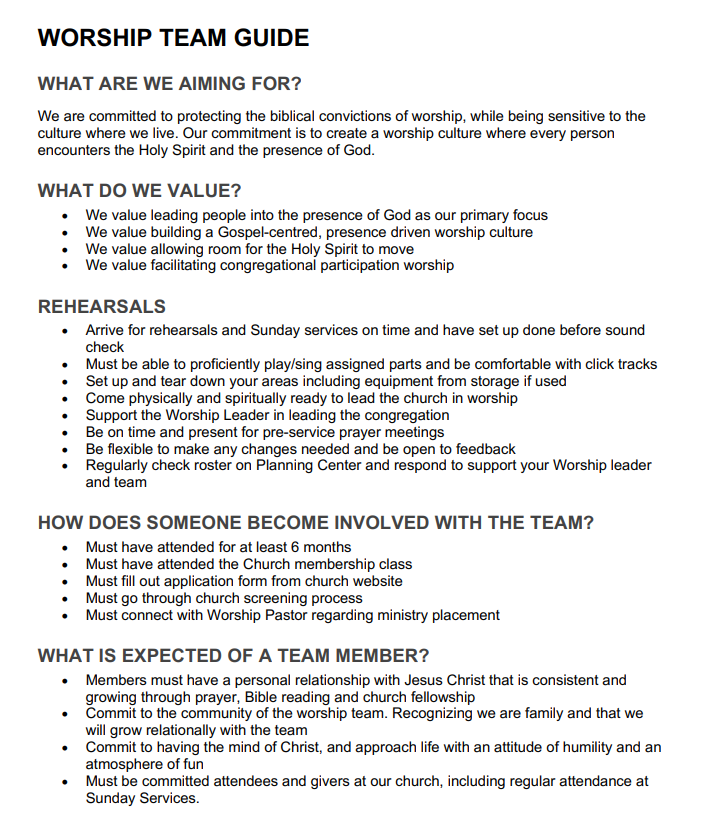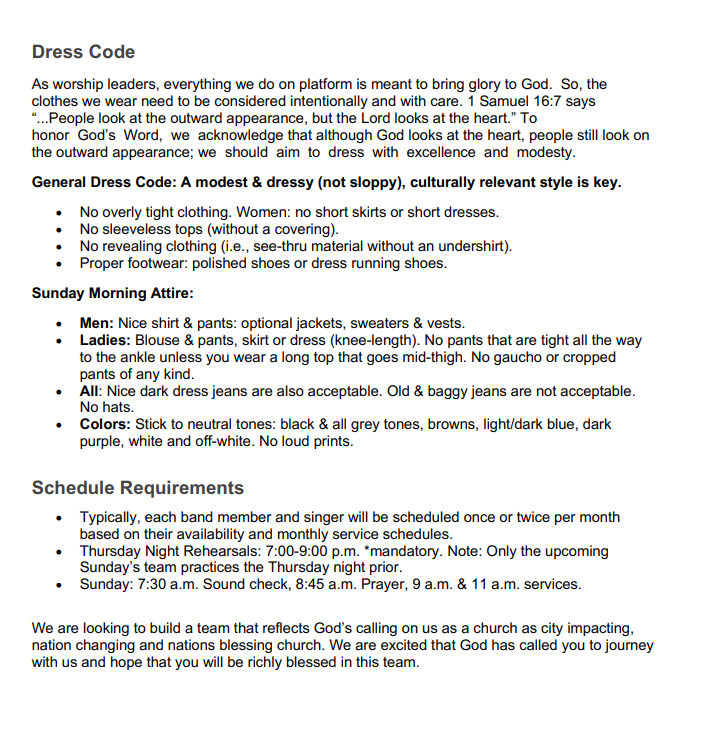Creating worship team guidelines can feel overwhelming when you're juggling the many responsibilities of leading a church. Without clear guidelines in place:
- Team members might not fully understand their roles, leading to confusion and inconsistency.
- You might feel like you're constantly managing conflict instead of focusing on worship.
- The worship experience can suffer, leaving the congregation disengaged.
These challenges often happen because expectations aren’t clear, and team members lack the structure they need to thrive.
That’s why I’ve created this guide to help you craft effective worship team guidelines. With examples and a ready-to-use template, you’ll have everything you need to foster unity, avoid misunderstandings, and create a worship team culture that glorifies God and serves your congregation well.
In this post, we're going to provide an overview of:
- What are worship team guidelines?
- Why worship teams need guidelines
- What to include in your worship team guidelines
- Worship team guideline example
- Other worship team guideline examples
- Worship team guidelines downloadable template
The best piece of advice I can give you is something I learned at a worship conference:
Develop Worship Team Guidelines!
This is a document that outlines everything needed and expected from a member of the worship team! Keep reading, and we'll walk through the process of developing a comprehensive set for YOUR church.
Related List of Tools: 10 Best Worship Software & Tools For Your Church
What Are Worship Team Guidelines?
Worship team guidelines are a clear code of conduct outlining the vision, values, expectations and responsibilities of being part of the worship team or music ministry.
Sometimes they're called a worship team code of conduct - and they're exactly that. They make sure there's clarity and everyone has a shared understanding of the expectations of joining and being part of the worship team.
Why Worship Teams Need Guidelines
Worship team guidelines enable us to communicate clearly to the team members what is expected of them.
So back to our friend James. Why do we need guidelines? Let me explain.
The guidelines are an easy tool to help guide and develop a worship team. It’s a clear communication tool where everyone can be on the same page, thus being able to focus on the main thing, which is leading worship and to lead others into worship!
If we don't have guidelines, we begin to rely on assumptions. I don’t want James to just assume that he can play whenever he feels like playing, or have him just showing up on a Sunday without attending rehearsals. I also want James to understand that he needs to be proficient in his playing.
I want others like James to have a well-defined understanding of what is expected of him and what he can expect from being on the team.
If we are not clear, it may result in awkward conversations for worship pastors, hurt feelings, and frustrations.
What To Include In Your Worship Team Guidelines
Here are some topics you could consider including in your worship team guidelines.
How Does Someone Become Part Of The Worship Ministry?
This is a great time to clearly outline the process for joining a team.
Being on the worship team is a privilege, and a blessing. It’s not something to be taken lightly. Which is why when we communicate to our friends, like James. We want them to understand that this is something to be taken seriously.
Yes, being members of the worship team is fun and rewarding, but it’s also hard work, so it’s important to see that people are committed, not only to the church, but going through the process to be considered for the worship team.
- Are team members expected to be members of your church?
- Do they need to attend a small group or church bible study?
- Do they need to be attending the church for a certain number of months or years?
- Is there a membership course they need to complete?
- Do they need to show that they can proficiently play or sing?
It's important to set the expectations clearly on how to join the team. It also might be worth having a worship team application form to make these expectations clear. You can find a great example from the Bethel Worship Team.
What Is Expected Of A Team Member?
Personal Standards
This is a great place to highlight the importance of the personal walk with God. I would also say that this is probably #1. It’s also important to regularly encourage your worship team in this area. Challenge them on their own personal worship, what does that look like for them?
Remember, first and foremost, all members of the worship team are worship leaders, they are not just playing music or putting on a performance. This must remain at the forefront of everyone's minds. Be clear about this expectation before asking volunteers to commit.
It’s important to remind the team members that our Sunday worship is our overflow from worshiping during the week. Our own personal worship at home with God is so important before coming and leading others.
This can also be a great place to address aspects such as:
- Attitude problems
- Gossip/slander amongst the team
- Submitting to leadership
Skills & Responsibilities
Although we recognize the importance of a pure heart, the musicians and vocalists also need to have enough skill so that they can follow the leading of the Holy Spirit. Here we should emphasize the importance of practice and preparation.
All of the praise team should have open hearts to receive advice, correction, and training, and should be committed to becoming proficiently skilled at their ministry.
Of course, one does not need to be a professional musician to worship the Lord, but we know that God honors the discipline of additional practice and preparation.
Musicians not only have a responsibility to craft their skill, but to also take responsibility for themselves. Have they brought all their proper equipment and cords? Have they learned their arrangement properly?
It's important to emphasize the importance of their personal responsibilities so that they are prepared and ready for rehearsals and ready to support the worship leader.
Rehearsals
It’s important to clearly outline the expectations of rehearsals and weekly practices. Not only the importance of regular attendance at rehearsals, but also your expectations for their rehearsals at home.
- Do you expect the team member to arrive with music memorized?
- Is sheet music or chord charts allowed?
- Is punctuality important?
- If they skip the rehearsal during the week, are they allowed to play on Sunday morning?
- Are rehearsals more than doing a run through of the set list, do you learn a new song, read some scripture from the Bible and pray as well?
- What time do they need to be available for sound checks?
Be prepared to make this section of your guidebook clear. If rehearsals are an important part of your Sunday morning preparation, you want to make sure all team members understand the importance of attending them on a regular basis.
It's also important to highlight how often they should be expected to play. A typical expectation for team members is to play once every three weeks.
Dress Code
Remember that dress codes will vary depending on the culture of your church. Here are some possible ideas for your dress code.
General Dress Code: Modesty & dressy, culturally relevant style are key.
- No overly tight clothing.
- No sleeveless tops (without a covering).
- No revealing clothing (i.e. see-thru material without undershirt, short skirts)
- Proper clean footwear
- Maintain Personal Hygiene ie: Wear deodorant
Technology & Software
This will also vary depending on what your church does. Is the musician or singer expected to bring their own laptop or iPad? Will they need to have their own in ear monitors (IEMs)? If IEM’s are expected, we usually like to give our musicians a few options if they need to purchase some. IEM’s can range from expensive, to more affordable.
Related Read: 10 Best Church Website Builder
Communication
It’s important to highlight how communication will be sent to the team. Who will be sending out the setlists? Communicate if you are using PlanningCenter or Elvanto for scheduling and setlists.
Explain the process about how to switch or cancel a shift and make it clear. The last thing you want to do is show up to a rehearsal and find out only then that you have no drummer available for Sunday.
Other Things To Add To Your Worship Team Guidelines
- Worship team mission statement
- Worship team vision
- Church beliefs
- Tips for stage presence
- Time commitment
Worship Team Guidelines Example
Below we've provided you with a simple example of a full set of worship team guidelines. You'll find it helpful to understand the context of these guidelines so you can adapt them for your own use.


Other Worship Team Guideline Examples
Below are some great examples of worship team guidelines.
If you are needing some more inspiration on what else can be added to your worship team guidelines, check out the resources below:
- Bethel Worship has some great articles on worship.
- Gateway Worship has a resource library where you can log in to review their worship handbook.
Worship Team Guidelines Template
Want to fast-track the process of creating your own worship team guidelines? Download our easily customizable below.
Conclusion
Remember that we also lead out of grace too; the praise team are like family members. Worship team guidelines are just that, a guiding tool. There may be times when a team member will make a mistake or have a misunderstanding. The important thing is to keep guiding them with love and grace, as we all strive to become more and more like Christ.
For more on worship teams, read about worship team training and worship team auditions.


